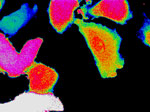
|
Genetically-encoded photosensitizers KillerRed and KillerOrange
- Light-induced production of reactive oxygen species
- Direct expression in cells, easy targeting to various subcellular compartments
- No exogenous chemical compounds required for chromophore maturation
- Not toxic before activation by light irradiation
- Recommended for selective light-induced protein inactivation and cell killing
 |
Genetically-encoded photosensitizers KillerRed and KillerOrange represent fluorescent proteins of GFP family that generate reactive oxygen species (ROS) upon light irradiation with certain wavelengths: 540-590 nm for KillerRed and 450-540 nm for KillerOrange. The photosensitizers are not toxic before activation by light irradiation.
KillerRed and KillerOrange can be used for selective light-induced killing of the cells. The level of cytotoxic effect and type of the cell death are dependent on the intracellular localization of the photosensitizers, their concentration, light intensity and time of irraditaion. The photosensitizers can be also applied for chromophore-assisted light inactivation (CALI) technology.
|
Due to substantially different excitation spectra, KillerRed and KillerOrange can be potentially used together for separate control of cell populations or chimeric proteins, as well as for enhancing the phototoxic effect of irradiation with white light.
Available photosensitizers
| PHOTOSENSITIZER |
DESCRIPTION |
ACTIVATION |
RELATED PRODUCTS |
 |
| KillerRed |
Red fluorescent genetically-encoded photosensitizer.
Due to red emission spectrum can be potentially used in tissue experiments in vivo
|
Green or orange (540-590 nm) light
|
 |
| KillerOrange |
Orange fluorescent genetically-encoded photosensitizer.
The blue-shifted spectra makes it potentially more suitable for two-photon microscopy
|
Blue or green (450-540 nm) light
|
 |
|





